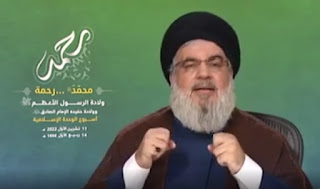Amir Tibon writes in Haaretz that the maritime border agreement between Israel and Lebanon are
The Abraham Accords, for all the optimism and economic benefits they created, did not save the life of one Israeli soldier. After all, Israel had never gone to war with Bahrain, the UAE or Morocco. The Lebanon deal mediated by Biden’s point man, Amos Hochstein, on the other hand, has the potential to avert a disastrous confrontation between Israel and Hezbollah.
Such a war would play out very differently than Israel’s periodic clashes with Hamas in Gaza: Conservative estimates include tens of thousands of rockets falling on Israeli cities, hundreds of casualties, and widespread destruction. If the agreement holds, this nightmare scenario will be prevented. It doesn’t mean peace will blossom between Israel and Lebanon, but securing quiet on Israel’s northern border is more important at the moment.
The assumption that the agreement will prevent war is part of an old tradition held by "experts" that I have called the
"if-then" fallacy: If Israel does X, then others will do Y.
An early example was
Michael Kramer in Time magazine who said, in 1988, that
if Israel would give a serious peace offer to Palestinians and the Palestinians reject it,
then the world wouldn't blame Israel for there not being peace.
Since then, Israel indeed did offer many serious peace offers, Palestinians rejected them all, and the world keeps blaming Israel.
Another example is ironically listed in Tibon's peace. In 2003, the conventional wisdom was that if Israel would just withdraw from Gaza, then Gaza would no longer be a problem for Israel, because there would be no incentive for Gaza groups to start wars.
Israel withdrew from Gaza - and Gaza groups continue to start wars every year or two.
What about Hezbollah, though? Aren't they a more rational actor than Hamas and Islamic Jihad? Couldn't they be trusted to react logically when Israel does what they want?
Well, in 2000, Israel withdrew from Lebanon - the entire raison d'etre of Hezbollah, it seemed. The UN certified Israel's full withdrawal. Certainly, the experts said, if Israel made a full withdrawal from southern Lebanon, then Hezbollah would have no claim on Israel and there would be peace. Yet Hezbollah continues to claim lands south of the UN-demarcated line, and it violate the Blue Line when kidnapping Israeli soldiers that sparked the 2006 Lebanon war.
Now, we are told that if Israel concedes the entire disputed area with Lebanon at sea, then Hezbollah will not do anything to jeopardize Lebanese sovereignty and will respect the border. Yet Lebanon and Hezbollah created a new "border" during the negotiations. What is stopping Hezbollah from claiming, whether this year or in five years, that Israel is extracting gas in Lebanese territorial waters and that it must "defend" the area?
Indeed, Hezbollah leader Hassan Nasrallah is
taking partial credit for the agreement, saying that Israel knuckled under to his threats to attack the Karish gas platform. This was
parroted by Hezbollah's deputy, saying it was Hezbollah strength that forced Israel to humiliate itself. They regard the agreement as a capitulation by Israel to Hezbollah threats.
This is not exactly the same "if-then" formula that the optimists are claiming.
The Shebaa Farms dispute, over a tiny amount of land, has been enough of an excuse for Hezbollah to continue claiming Israel is the aggressor and that it is protecting Lebanon with an army and arsenal that rivals those of many nations. Why would it act any differently over a maritime border?
Moreover, Hezbollah is not an independent player. It follows what Iran's supreme leader wants. If Iran tells Hezbollah to shoot a thousand rockets into Israel , Hezbollah will not listen to the "experts" about how pragmatic it is. It would do what terror groups always do: create a pretext that will mollify Leftist antisemitic allies ("we are protecting Jerusalem from Judaization!") and shoot the rockets.
There is no doubt that in the short term, this maritime agreement will cool tensions on the Lebanese border. But the hundreds of square kilometers Israel gave up are not only for the short term, but forever. Giving up something so valuable in exchange for an assumption of how a terror group will act far into the future, without a single Hezbollah pledge or signature, is taking the if-then fallacy to new lengths.
|
 Buy the EoZ book, PROTOCOLS: Exposing Modern Antisemitism today at Amazon! Buy the EoZ book, PROTOCOLS: Exposing Modern Antisemitism today at Amazon!
Or order from your favorite bookseller, using ISBN 9798985708424.
Read all about it here!
|

|


 Elder of Ziyon
Elder of Ziyon









![[Elder of Ziyon] Facebook may add "Insha'Allah" button for events](https://blogger.googleusercontent.com/img/b/R29vZ2xl/AVvXsEi9KIDYyRBYSDMD-x2PZwXZNYKl0eHCeNWbuEWt6IvsNL6IFhtZTpF2SvNRlui4o-nPTjPMcmSOxJ1nPo0pPGPzI5r7GHO_ZfKV9WUcNnkMeMslnkgWq0GeILJg-5vXLLCLckj6SUmdJqmc/s72-c/arabic_facebook_logo_by_ali_normal-d37tr0q.jpg)



